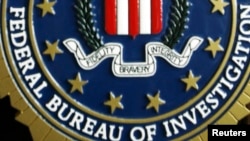The U.S. Department of Justice has charged six Chinese nationals with economic espionage and theft of trade secrets for allegedly accessing secret U.S. technologies and sharing them with universities and companies controlled by the Chinese government.
Unsealing an indictment filed last month, U.S. officials in Washington announced the charges Tuesday. The defendants, all Chinese nationals, include Hao Zhang, who is in custody, his fellow engineer Wei Pang and four other Chinese engineers and professors of stealing trade secrets from two U.S. technology companies, Skyworks Solutions and Avago Technologies.
The American companies produce radio-frequency filters known as FBARs (thin film bulk acoustic resonators) - devices used in cellphones and other mobile devices that process incoming and outgoing wireless signals.
US-trained engineers
Pang and Zhang were awarded doctorates in electrical engineering from a university in California in 2005 and subsequently began working for Avago and Skyworks, respectively.
According to the indictment, during 2006 and 2007 the two U.S.-trained engineers, together with other co-conspirators approached Chinese universities and companies with proposals to begin manufacturing FBAR chips in China.
By 2008, they began working with Tianjin University to establish a FBAR fabrication facility there while continuing their work at Avago and Skyworks, U.S. officials said. One year later they resigned and took up full-time professorships at the school, later forming a company to mass-produce FBARs.
Those indicted along with Pang and Zhang were identified as Jinping Chen, Huisui Zhang, Chong Zhou and Zhao Gang.
Stealing code and more
The defendants, all of whom range in age from 26 to 41 years old, are accused of stealing computer source code and processes, specifications, design layouts and other documents from the American technology companies, sharing the information among themselves and with others working for Tianjin University.
"The defendants leveraged their access to and knowledge of sensitive U.S. technologies to illegally obtain and share U.S. trade secrets with [China] for economic advantage,” said John Carlin, the U.S. assistant attorney general for national security.
The FBI's David Johnson says the conduct alleged in the indictment revealed "a methodical and relentless effort by foreign interests to obtain and exploit sensitive and valuable U.S. technology through the use of individuals operating within the United States."
"The FBI is committed to rooting out industrial espionage that puts U.S. companies at a disadvantage in the global market," he said.
Zhang was arrested in Los Angeles on May 16 when he arrived on a flight from China. He faces a maximum of 50 years in prison if convicted. Arrest warrants have been issued for the other five defendants.





